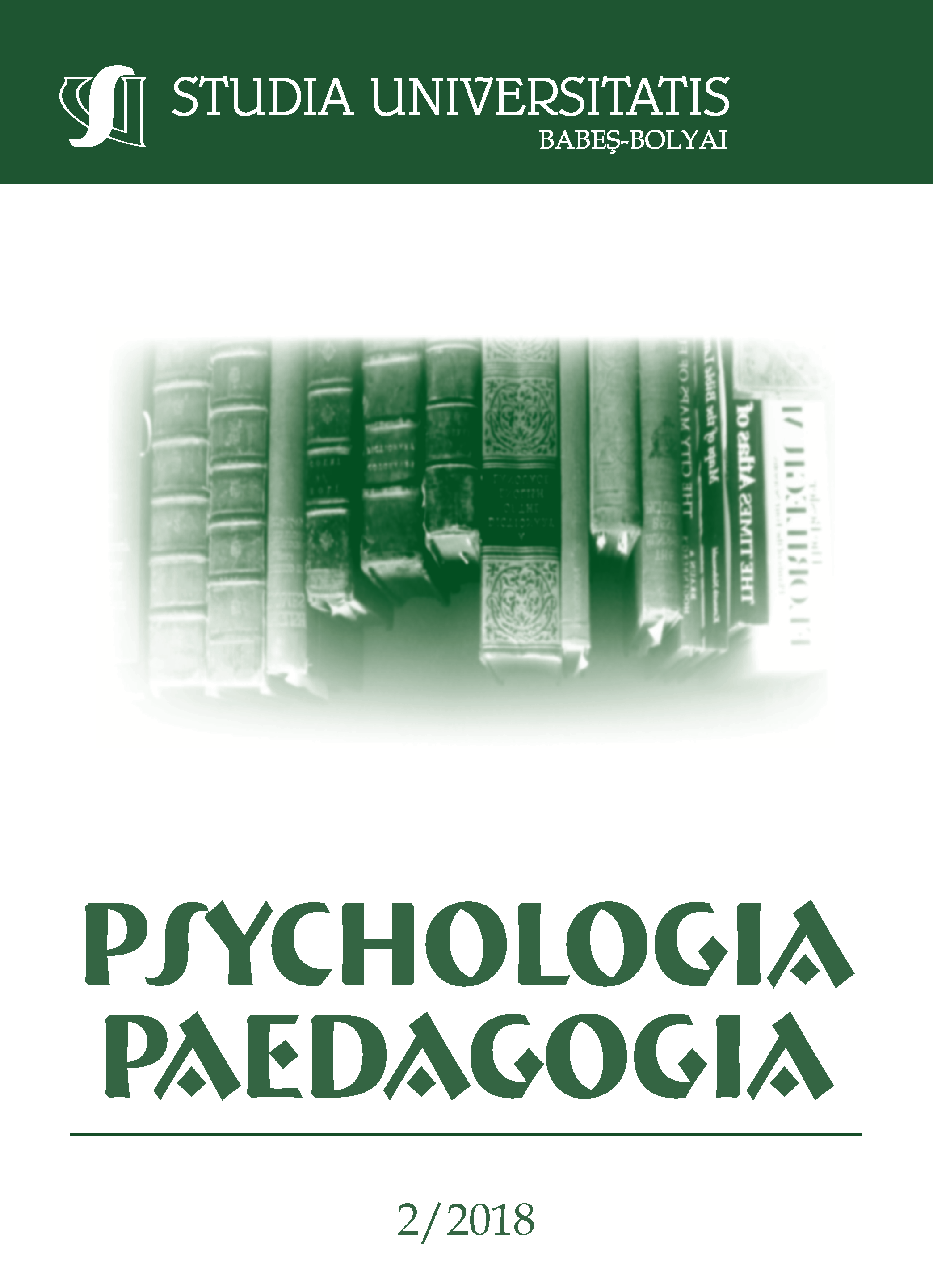AN INTERCULTURAL TURN IN PRE-SERVICE TEACHER TRAINING. A PERSPECTIVE ON THE ENGLISH LANGUAGE TEACHING.
DOI:
https://doi.org/10.24193/subbpsyped.2018.2.05Keywords:
foreign language learning, pre-service teacher training, intercultural communicative competence, cultural background, diversity, identity, language knowledge, non-native speaker.Abstract
This paper intended to emphasize the constant need to tailor teaching to today’s educational requirements. Language learning in the 21st century must reflect the diversity of languages and cultures that are met in a formal education setting. Likewise, the roles of teachers are expending due to the need to teach effectively diverse learners. The research that has been conducted concluded that pre-service teachers managed to a great extent to incorporate in their teaching cultural perspectives and were able to evaluate and select teaching resources that presented the deeply rooted relationship between culture and language.References
Bârlogeanu, L. (2005). Intercultural Education. [Educaţie interculturală]. Bucureşti: Editura MEC.
Byram, M. (1997). Teaching and assessing intercultural communicative competence. Clevedon: Multilingual Matters.
Bransford, J., LePage, L.D-H. (2005). Introduction. In Linda Darling-Hammond & John Bransford (Ed.). Preparing Teachers for A Changing World. What teachers should learn and be able to do (pp. 1-39). USA: Wiley Imprint.
Carl A., Grant., P (1992). Research & Multicultural Education: From The Margins To The Mainstream. Oxon, New York: Routledge.
Cosma, M., Cosma, B. O. (2006). Intercultural Education: from theory to practice. [Educația interculturală: de la teorie la practică]. Sibiu: Editura Universității Lucian Blaga
Cozma T., Butnaru S., Cucoş C. (2001). Intercultural Education. A guide for trainers. [Educaţia interculturală. Ghid pentru formatori]. Iaşi: Editura Erota.
Cucoş, C. (2000). Education. Cultural and Intercultural Dimensions. [Educaţia. Dimensiuni culturale şi interculturale]. Iaşi: Editura Polirom.
DaSilva-Iddings, A.C. (2017). Introduction. In Ana Christina DaSilva-Iddings (Ed.). Re-Designing Teacher Education for Culturally and Linguistically Diverse Children. A Critical-Ecological Approach. Oxon, New York: Routledge.
Diaz-Rico, L.T. (2000). TESOL Education in the Context of Diversity. In Karen E. Johanson (Ed.). Teacher Education. Case Studies in TESOL. Practice Series (pp. 71-83). USA: TESOL Inc.
Dong Y.R. (2000). Learning to See Diverse Students Through Reflective Teaching Portofolios. In Teacher Education. Case Studies in TESOL. Practice Series. In Karen E. Johanson (Ed.). Teacher Education. Case Studies in TESOL. Practice Series (pp. 137-151). USA: TESOL Inc.
Iucu, R. (2007). Quality and training – a multicultural dimension of quality assurance processes in teacher training programmes [Calitate și formare – dimensiunea multiculturală a proceselor de asigurare a calității în sisteme de formare a personalului didactic]. In Bârlogeanu L. (Ed.). Interculturality – studies, research, experiences [Interculturalitate – Studii, cercetări, experiențe]. București: Editura Universității din București.
Golombek, P.R, (2000). Promoting Sense-Making in Second Language Teacher Education. In Karen E. Johanson (Ed.). Teacher Education. Case Studies in TESOL. Practice Series (pp. 87-104). USA: TESOL Inc.
Llurda, E. (2005). Non-Native language teachers: perceptions, challenges and contributions to the profession. Springer: USA.
Medgyes, P. (2001). When the Teacher is a Non-Native Speaker. In Celce-Murcia, Marianne (Ed.). Teaching English as a Second or Foreign Language, third Edition (pp. 429-442). Boston: Heinle & Heinle.
Modiano, M. (2005). Cultural studies, foreign language teaching and learning practices, and the NNS practitioner. In Enric Llurda (Ed.). Non-Native language teachers: perceptions, challenges and contributions to the profession (pp. 24-44). USA: Springer.
Nardon, L. (2017). Working in a Multicultural World. A Guide to Developing Intercultural Competence. Canada: University of Toronto Press.
Nedelcu, A. (2008). Principles in intercultural education. [Fundamentele educatiei interculturale]. Iași: Editura Polirom
Pop, R. (2016), Foreign Language Learning in Today’s Multicultural and Multilingual Classrooms. In Studia Universitatis Babes-Bolyai, Philologia, volume 61, issue 3 (pp 231-238).
Pop, R. (2015). Developing students’ intercultural communicative competence. Applications in The Pre-Service Teacher Training Practice for the English Specialization [Modelarea competenţei comunicative interculturale a studenţilor. Aplicații pentru formarea inițială la specializarea engleză]. Cluj-Napoca: Casa Cartii de Stiinta.
Regan, T., Osborn, T.A. (2002). The foreign language educator in society: toward a critical pedagogy. New Jersey: Lawrence Erlbaum Associates.
Sercu, L. et al. (2005). Foreign Language Teachers and Intercultural Competence. An International Investigation. UK, USA, Canada: Multilingual Matters Ltd.
UNESCO World Report (2009). Investigating in Cultural Diversity and Intercultural Dialogue. France: The United Nations Educational.
Vang C.T. (2010). An Educational Psychology of Methods in Multicultural Education. New York: Peter Lang Publishing Inc.
Electronic sources
Europeean Commission. (2015). Joint Report of the Council and the Commission on the implementation of the Strategic framework for European cooperation in education and training (ET2020). Retrieved November 15, 2018from http://ec.europa.eu/education/documents/et-2020-draft-joint-report-408-2015_en.pdf
European Commission (2015). Strengthening teaching in Europe: New evidence from teachers compiled by Eurydice and CRELL. Luxembourg: Office for Official Publications of the European Communities. Retrieved November 20, 2018 from http://ec.europa.eu/assets/eac/education/library/policy/teaching-profession-practices_en.pdf
Newby, D. et al. (2007). European Portfolio for Student Teachers of Languages: A reflection tool for language teacher education. Gratz: ECML. Retrieved November 2, 2018, from http://archive.ecml.at/mtp2/fte/pdf/c3_epostl_e.pdf
Villegas, A.M., Lucas, T. (2002). Preparing Culturally Responsive Teachers: Rethinking the Curriculum. In Journal of Teacher Education, Volume: 53 issue: 1 (pp. 20-32). Retrieved November 18, 2018 from http://citeseerx.ist.psu.edu/viewdoc/download doi=10.1.1.618.3136&rep=rep1&type=pdf
Downloads
Published
How to Cite
Issue
Section
License
Copyright (c) 2018 Studia Universitatis Babeș-Bolyai Psychologia-Paedagogia

This work is licensed under a Creative Commons Attribution-NonCommercial-NoDerivatives 4.0 International License.





